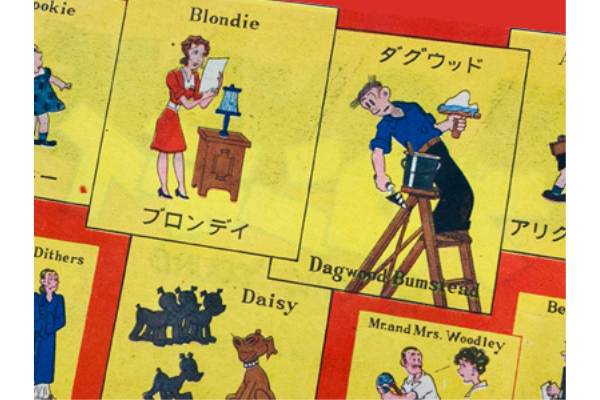
The Institute for Japanese Studies and University Libraries Area Studies and Billy Ireland Cartoon Library & Museum present:
Global Comics and the Rise of Modern Manga
with speakers
Ron Stewart, "Transcultural Flows and Kitazawa Rakuten’s Early Inspirations"
Daito Bunka University
Eike Exner, "How Manga Eclipsed Comics"
Independent Scholar
Shige "CJ" Suzuki, "Transnational Encounters between Postwar Japanese Manga and American Comics, 1945-1970s"
Baruch College, City University of New York
Flyer:
with moderators
Jared Gardner
The Ohio State University
and
Kinko Ito
University of Arkansas at Little Rock
Abstract: Where does manga come from? What role did U.S. comics play in shaping modern manga? And how did manga become a dominant force in global comics in recent decades? Join us as we explore these questions and more in the upcoming symposium “Global Comics and the Rise of Modern Manga” moderated by Dr. Jared Gardner, Professor of English and Director of the Humanities Collaboratory and Dr. Kinko Ito, Professor of Sociology, University of Arkansas, Little Rock and OSU Alum. Exploring the development of manga in the twentieth century, three international experts in popular culture and comics studies will contest current narratives that treat manga as exotic or disconnected from its American and European counterparts.
Jared Gardner is Joseph V. Denney Designated Professor of English, specializing in American literature, comics, film, and popular culture. Gardner is the author of Master Plots: Race and the Founding of an American Literature, 1787-1845; Projections: Comics and the History of 21st-century Storytelling; and The Rise and Fall of Early American Magazine Culture. Other books and writings can be found at Gardner's website. Gardner also serves as director of the Popular Culture Studies program at Ohio State and is a frequent collaborator with the Billy Ireland Cartoon Library & Museum.
Kinko Ito received her M.A. and Ph.D. in Sociology from The Ohio State University. She is nationally and internationally known for her research on Japanese popular culture (especially manga comics) and the Ainu, the indigenous people of Japan. A Sociology of Japanese Ladies’ Comics: Images of the Life, Loves, and Sexual Fantasies of Adult Japanese Women, her harbinger work on women’s comics, the first kind in the world, was published by Edwin Mellen Press in 2011.
Abstract "Transcultural Flows and Kitazawa Rakuten’s Early Inspirations": The first panelist, Dr. Ron Stewart will discuss international influences on Kitazawa Rakuten (1876-1955), arguably Japan’s first career comic artist and a major figure in the first decades of the twentieth century. In his paper, "Transcultural Flows and Kitazawa Rakuten’s Early Inspirations," Stewart will focus on the increasingly transnational media space that characterized Rakuten’s early career from the turn of the twentieth century to the 1920s.
Ronald Stewart, a professor in the Department of Sociology at Daito Bunka University, has published papers on representation, cartoons, and comics in a number of journals and books in both English and Japanese. In the early 2000s, he was a comic art columnist for "Manga Site" in Japan's largest national newspaper the Yomiuri Shinbun. Since 2003, he has been a member of the Japan Society for Studies in Cartoons and Comics (recently serving as a society director and as it's reviews editor). Currently, he sits on the board of directors for the Kitazawa Rakuten Appreciation Society at Saitama Municipal Cartoon Art Museum.
Abstract "How Manga Eclipsed Comics": Dr. Eike Exner will focus on the basis of modern manga as a function of Japanese translations of American comic strips in the 1920s. Drawing on his recent book publication, Comics and the Origins of Manga, A Revisionist History (Rutgers University Press, 2021), his paper, "How Manga Eclipsed Comics," will ask how Japanese comics eventually surpassed its U.S. and European counterparts economically and in terms of global influence.
Eike Exner is the author of the new manuscript Comics and the Origins of Manga, A Revisionist History (Rutgers University Press, 2021). He is an independent scholar who has taught at the University of Southern California in Los Angeles and Josai International University in Tokyo. His research has also appeared in the International Journal of Comic Art, ImageTexT, and The Comics World, and he has received the John A. Lent Award in Comics Studies.
Abstract "Transnational Encounters between Postwar Japanese Manga and American Comics, 1945-1970s": Dr. Shige "CJ" Suzuki explores how Japanese mangaka (comics creators) employed non-domestic styles and narrative methods to (re-)innovate the medium of manga in the postwar era. In his paper, "Transnational Encounters between Postwar Japanese Manga and American Comics, 1945-1970s," he calls for a transnational perspective that recognizes manga/comics as the complex (and fluid) product of various cultural traditions and media forms.
Shige "CJ" Suzuki is an Associate Professor of Modern Languages and Comparative Literature at Baruch College, CUNY specializing in comparative literature, film, and popular culture. His current research interests include Japanese speculative fiction in different media forms, examined through the lens of posthumanism, and manga/comics (graphic novels) in conversation with media theories and visual culture studies. His writings can be found at https://baruch-cuny.academia.edu/CJ
facilitated by
Kay Clopton, PhD, MLIS is the Humanities and Social Sciences librarian for The Ohio State University. She earned her PhD in Comparative Studies studying sound and emotive effects in Japanese manga and North American comics and how they impact the reading experience.
and
Ann Marie Davis, PhD, MLS is Associate Professor and Japanese Studies Librarian at The OSU Libraries. She manages OSU's world-class Japanese language and global manga collections in consultation with the Billy Ireland Cartoon Library & Museum and International and Area Studies at Thompson Library.
